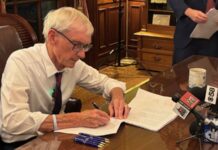Economic growth in the United States is expected to level off in 2020 without spiraling down into a recession, according to Federal Reserve Bank of St. Louis President and CEO James Bullard.
“If the economy slows to its potential growth rate, then we say it’s a soft landing,” Bullard said yesterday at the Wisconsin Bankers Association’s Economic Forecast Luncheon in Madison. “If it slows below, or goes even further and crashes into recession then we say that’s a hard landing. Right now I think we’re not in the hard landing category.”
In the second and third quarters of 2018, the national economy was growing at a year-over-year pace of over 3 percent as optimism was driven by deregulation and the corporate tax cut of 2017.
Since then, U.S. growth has been slowing, which Bullard said was “not unexpected” due to trends in labor force and productivity.
“So now it’s coming back down toward 2 percent, and then the question has been whether [growth] would continue to sink there or whether it would flatten out … the expectation has been that it will continue to flatten out,” he said.
In a Q&A session with reporters, Bullard said he’s happy with where interest rates are now and doesn’t see a need to change them for the next year or so. He noted federal regulators made substantial moves to change U.S. monetary policy last year, “and now we should wait and see what the effects are in the first half of 2020 and beyond that.”
Bullard also discussed how uncertainty surrounding global trade agreements has chilled global investment as well as the global growth rate.
“Trade issues are important inside the United States, and they’re important in places like Wisconsin here, but they’re even more important outside of the U.S.,” he said. “Global investors care a lot about what the U.S. is going to do on trade policy, and how that’s going to affect global supply chains.”
The United States is currently in the midst of its longest expansion period in history, and Bullard said volatility in the national economy is “quite a bit lower” than it was in previous eras. Bullard says that means “you don’t have to view recessions as quite as inevitable as they might have been viewed in the 70’s and 80’s.”
Responding to an audience question on the federal deficit, Bullard described himself as a “deficit and debt hawk.”
“I would say that it would pay for the U.S. to get its long-run fiscal position in line so we know how we’re going to pay for things even out 30, 40 or 50 years,” he said. “I do think however that the standard rules of thumb about how much debt is too much debt, and how big a deficit is too big a deficit, are too simplistic.”
He noted other countries such as Japan have proved this historical wisdom wrong, as they “seem to not be having any problems” despite having relatively high levels of debt.
Still, he cautioned bankers should “borrow with a purpose.”
“It’s fine if you want to borrow, but borrow to improve the productive capacity of the country,” he said. “That’s a great thing to do. If you borrow to have a party, you’re going to have a hangover.”
The federal budget deficit is estimated at $960 billion in 2019 and averages $1.2 trillion between 2020 and 2029.
Global trade uncertainty has “declined somewhat,” Bullard said. He noted the USMCA is likely to pass and also pointed to developments in negotiations with China and lower uncertainty surrounding Brexit. Still, he said this type of global uncertainty takes time to resolve and predicts “continuing uncertainty” regardless of which party controls the White House and Congress.
Bullard noted that U.S. businesses “aren’t sitting on their hands” amid all the uncertainty.
“They now have had time to develop strategies and business practices to cope with the idea that trade policy isn’t as settled as it once was,” he said. “Nevertheless, they’re going to diversify their supply chains, and they’re going to think about different ways to operate internationally.”
Because of that, he predicted trade policy uncertainty will be “less of an issue in 2020 than it was in 2019.”
Watch a video of the event from WisconsinEye: https://wiseye.org/2020/01/09/wba-economic-forecast-st-louis-federal-reserve-bank-president-and-wedc-secretary-keynote/
–By Alex Moe
WisBusiness.com






